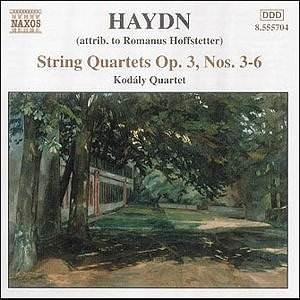Haydn lovers will need no encouragement from me to
investigate this issue. Naxos have put us in their debt, as they have
with so many other projects, with their recorded survey of Haydn by
the Kodály Quartet. I canít pretend to have heard every disc,
but of the issues I know there is not one which is less than excellent,
and the majority would be worth buying even at full price. The playing
is consistently fine, lacking nothing in divertimento spirit in the
early works, nor in that life-enhancing mixture of substance and lightness
of touch which is the mature Haydn. They do not disappoint here.
There is an important matter to be taken into account,
though, in respect of this disc, which is that there is considerable
doubt as to whether these quartets are actually the work of Haydn. The
situation, briefly outlined, is as follows. After 1765 Haydn kept a
running catalogue of his works; absolutely essential, I should have
thought, with such a prolific composer. These quartets do not feature
in that catalogue, but on the other hand they are to be found in a comprehensive
catalogue prepared under the composerís direct supervision in 1805 as
well as in a complete catalogue of his quartets which was published
by Pleyel three years earlier. There would seem to be documentary evidence,
however, that Haydn may not have had the opportunity to examine and
therefore be able truly to verify the authenticity of these works prior
to their inclusion in these catalogues. A further complication is that
the earliest copies still in existence are of printed editions published
in Paris in 1777. Even the absence of any manuscript is unusual for
this composer, but furthermore there is a suggestion that traces remain
on these printed copies of an attribution to Romanus Hoffstetter, thus
allowing for the possibility that the Parisian publisher substituted
the name of Haydn, a better sales bet, for that of the true composer,
a priest and musician about whom relatively little is known. Scholars
who have examined the present quartets alongside the few existing works
of Hoffstetter have come to conclusion that although he would seem to
have been capable of composing them, if they are truly from his pen,
they undoubtedly represent his best work. Others have also noted that
these quartets contain elements of style which are both typical and
atypical of Haydnís work of the period.
The question of authenticity is therefore a complex
matter, and even the greatest authorities on the music of Haydn and
of the music of this period in general have published conflicting opinions
on it. And of course, given this uncertainty, we should not be surprised
that the dates of composition are unknown.
In the face of this musicological conundrum I have
nothing of my own to offer, except to say that had I not known of the
difficulty I would have accepted these quartets without question as
examples of Haydnís early string quartet style. They are charming works,
tuneful, jolly, and with one or two of those musical surprises to which
the composer treated us more and more as he matured. The slow movement
of the F major quartet is a most beautiful violin melody accompanied
by the other strings pizzicato and which gives the work its name.
It is also one of those tunes which, maddeningly, one finds one already
knows without having the slightest idea of why or where or when.
Whoever wrote these works the Kodály Quartet
devote their remarkable and familiar skills to them and the disc is
beautifully recorded. The booklet notes are by Allan Badley. I am indebted
to him for the above information and my attempt to summarise his essay
seems clumsy by the side of his clarity and eloquence. Altogether an
hour of delightful music, beautifully played, and well worth a place
in any chamber music collection.
William Hedley


